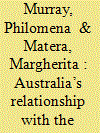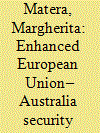| Srl | Item |
| 1 |
ID:
159681


|
|
|
|
|
| Summary/Abstract |
After decades of tension, Australia and the European Union (EU) now have a substantive relationship, interacting and cooperating with each other within a wide range of areas. The relationship is currently at a critical turning point. The Framework Agreement has, for the first time, elevated the relationship to a treaty level. It strengthens Australia–EU actions and interests on bilateral, regional and multilateral issues. There is considerable potential for closer cooperation and more extensive pooling of the resources and capacities of both interlocutors on a range of policies and within the multilateral context. This article provides an assessment of the relationship, the current state of play and key challenges facing the relationship as the EU and Australia forge stronger ties through the conclusion of a Framework Agreement and the commencement of discussions on a Free Trade Agreement at the same time as the UK’s exit negotiations from the EU. It demonstrates that, although there are challenges facing the relationship, there are also significant opportunities to further develop and strengthen ties.
|
|
|
|
|
|
|
|
|
|
|
|
|
|
|
|
| 2 |
ID:
159684


|
|
|
|
|
| Summary/Abstract |
Since January 2003, the European Union (EU) has launched over 30 civilian and military crisis management missions under the Common Security and Defence Policy. These missions have involved the participation of both EU member states and third states. In order to help facilitate the participation of third states in these missions, the EU established the Framework Partnership Agreements on crisis management, setting out the legal framework for third-state participation. In April 2015, Australia became the seventeenth country to sign such an agreement with the EU. This agreement reflects both the common interest and values shared by Australia and the EU and the extent to which EU–Australia relations have evolved and deepened over the years. In addition, the increased engagement and socialisation of Australian military and civilian personnel with individual EU member states through their participation in such operations as the International Security Assistance Force operation in Afghanistan, led by the North Atlantic Treaty Organization, and the Combined Maritime Force have further facilitated opportunities for security cooperation at the EU level. Shared concerns and interests on counterterrorism, counter-piracy, instability and capacity-building have also opened up opportunities for increased cooperation between the EU and Australia. This article assesses the significance of the Framework Partnership Agreements on crisis management for EU–Australia relations within the area of security cooperation, and examines future prospects for cooperation.
|
|
|
|
|
|
|
|
|
|
|
|
|
|
|
|